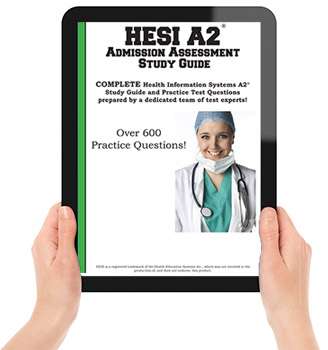Everything you Need! Free practice questions, exam registration information, HESI Online Course, Test Taking and Test Prep Tips, plus study guides and practice tests
About the Health Education Systems A2 Exam
Colleges and universities use the Health Education Systems Incorporated. Admission Assessment Exam (HESI A2) tests throughout the United States. While some schools use the HESI admission assessment exam for nursing program applicants, other schools also require individuals applying to health sciences programs in diagnostic medical sonography, nursing, radiologic technology, and surgical technology to take variations of the HESI admission assessment exam.
Also known as the Evolve Reach Admission Assessment, the HESI admission assessment exam is a multiple-choice test with five scored exam topics and one unscored personality assessment. Test-takers are allowed a maximum of five hours and fifteen minutes to complete the exam.
Nursing program students must have a minimum HESI composite score of 65 to apply for admission. The exam is administered online.
Online HESI Practice Course
Try a Free Quiz

What is on the HESI
- Learning styles inventory
- Personality Profile
- Reading Comprehension-38 questions
- Vocabulary and General Knowledge-50 questions
- Grammar-50 questions
- Critical Thinking- 25 questions
- Basic Math Skills- 50 questions
- Biology-25 questions
- Chemistry-25 questions
- Anatomy and Physiology-25 questions
Students must take the following 4 HESI A2 sub-exams:
- Reading Comprehension
- Grammar
- Anatomy & Physiology
- Math Students must achieve a 75% or above in all subject areas with a maximum of two attempts
The HESI A2 and the HESI
The Health Education Systems, Inc. Admissions Assessment (HESI A2) or Evolve Reach Admissions Assessment and the HESI, or HESI Exit are two different exams.
Reading Comprehension
This sub-section provides reading scenarios in order to measure reading comprehension, identifying the main idea, finding the meaning of words in context, passage comprehension, making logical inferences, etc. There are a lot of thematic questions involved in the reading comprehension section of the HESI Exam. You’ll read a passage and the exam will ask you (in a variety of ways) if you understand what you have read. There will usually be around eight questions per passage.
The reading section has 47 questions that must be answered in 60 minutes. Below is a more detailed list of the types of reading questions that generally appear on the test.
- Drawing logical conclusions
- Identifying main ideas
- Meaning in context
- Distinguish fact from opinions
- Making inferences
- Identifying tone and purpose
- Summarizing
Reading Comprehension Practice and Tutorial
Reading Comprehension Practice – 20 questions
Reading Comprehension Practice II – 8 questions
English Language & Vocabulary
The English Language section has 55 test items (50 scored and 5 pilot/unscored). It’s broken down into three sub-sections: Reading Comprehension, Vocabulary and General Knowledge, and Grammar.
Grammar
This sub-section contains basic grammar, including parts of speech, important terms and their uses, commonly occurring grammatical errors, etc. The test focuses a lot on questions like “Fill in the blank of the following sentence to make it most grammatically correct.” There are also questions that list multiple sentences and ask “Which of the following is incorrect?” This means that you need to know basic vocabulary and grammar rules; however, you should be able to use context clues to answer most questions accurately.
Topics likely to appear on the test.
- Subject-verb agreement
- Verb tense
- Proper usage of pronouns
- Punctuation
- English usage
English and Vocabulary Practice and Tutorials
English Usage – 15 questions
English Grammar – 20 questions
Punctuation – 12 questions
Mathematics
The Math section has 55 test items (50 scored and 5 pilot/unscored) and has only one section: Basic Math Skills.
Basic Math Skills
This sub-section focuses on math skills needed for health care fields, including basic addition, subtraction, multiplication, fractions, decimals, ratio and proportion, household measures, general math facts, etc. Fortunately, you will be able to use a computer calculator on the HESI A2 test. You should know conversions, fractions, decimals, and word problems.
Fractions: You will need to understand fractions. This includes how to add and subtract fractions with unlike denominators and mixed numbers. If you can reduce fractions and find the common denominator, you will be fine with the HESI exam fraction questions. Fractions Practice
Word Problems: There are several word problem questions that use basic operations such as addition, subtraction, multiplication, and division, as well as mathematical reasoning. Word Problem Practice How to Solve Word Problems
Proportion: Find the value of X from a proportion and be able to make a proportion to find a percent. (Example: 47% of the class is female and the total number of students is 54. How many students are male?)
Conversions: Metric conversion such as liters to milliliters, ounces to cups, gallons to cups, kilograms to pounds, milliliters to ounces, etc. Metric Conversion Tutorial and Practice
Roman Numerals: Brush up on roman numerals (basic). There will be a few questions asking you to identify a roman numeral as a number. Below is a handy roman numerals table to learn from.
Mathematics Practice
Exponents – 8 questions
Basic Math – 10 questions
Basic Math 2 – 10 questions
Word Problems Tutorial and practice
Percent – 18 questions
Metric Conversion – 8 questions
Fractions, Percent and Decimals – 14 questions
Science
The Science section has 30 test items (25 scored and 5 pilot/unscored). It’s broken down into three sub-sections: Biology, Chemistry, Anatomy and Physiology, and Physics. The Physics component is currently being tested and is not given at all institutions. Be sure to check with your school for the exact content of the test you will be taking..
Biology
- Cellular processes
- Classification and Taxonomy
- Photosynthesis
- Genetics
Scientific reasoning and scientific method
Chemistry
- Atoms and molecules
- Protons and electrons
- States of matter
- Redox reactions
- Chemical reactions
- Acid and base
- Molarity
- The Periodic table
Physics (optional)
- Potential, mechanical and kinetic energy
- Speed, acceleration and momentum
- Electricity – currents voltage and resistance
- Ohm’s law
- Newton’s laws
- Linear and rotational motion
Science Practice and Tutorial
Anatomy and Physiology
The most difficult section of the HESI Exam is A&P. This sub-section provides coverage of general terminology and anatomical structures and systems.
- Basic heart anatomy: Atriums and layers of the heart.
- Circulatory system: Major arteries and veins.
- Endocrine system: What glands secrete what hormones. What specific hormones do. How specific glands are regulated.
- Joints: Know the basic joints of the body.
- Muscles: There are a few basic muscle anatomy questions that may ask where a specific muscle is located.
- Skeletal system: Know what bone is where and the four basic types of bones. Know what specific types of bone marrow do.
- Nervous system: Know the sections of the brain and the cranial nerves. Understand the ear and eye anatomy. Know each organ in the nervous system and what they do.
- Cell organelles: Know the organelles of the cell and what they do.
Anatomy and Physiology Practice and Tutorial
Anatomy and Physiology – 5 questions
Anatomy and Physiology II – 30 questions
Testing Options
You can take the HESI A2 test through one of the following:
- Online through ProctorU ($42)
- In-person at a Prometric testing center ($120)
Taking the Online HESI A2 Exam through ProctorU
To take the exam online through ProctorU, you’ll need:
- Desktop or laptop computer
- Webcam
- Microphone
Registering for the Online HESI A2 test
To register for an online HESI A2 test,
- Email TR.TestingServices@tccd.edu and ask for a HESI A2 test Request form.
- Complete and submit your form.
- Once your information has been reviewed, you’ll receive a registration link and instructions.
You’ll need to create a ProctorU account to register if you don’t already have one.
Retaking the Online HESI A2 Exam?
If you have already taken the online HESI A2 and 60 days have passed since your first test date, you may take the online HESI A2 again. Repeat the steps above to register for an online HESI Exam.
Do not request the HESI A2 Request form unless 60 days have passed.
Canceling/Rescheduling an Online HESI Exam.
If you need to cancel or reschedule your online HESI A2, contact ProctorU at 855-772-8678.
TCC Testing Services is unable to cancel or reschedule your ProctorU exam appointment.
HESI A2 FAQ
HESI Practice and Study Guide – PDF Download

Reviews: 4.5 Stars
Learn More and Start Practicing Today
You Receive:
- Hundreds of HESI Practice Test Questions
- Answer Key with Step-by-Step Answer Key
- Easy to follow Tutorials
- Multiple Choice Tips and Strategies from Exam Experts
- Self-Assessments to Identify your Strength and Weaknesses
- How to make a Study Plan and Study Schedule
- Practice Test Questions for Reading Comprehension, Vocabulary and General Knowledge, Grammar, Critical Thinking, Basic Math Skills, Biology, Chemistry, Anatomy and Physiology
- And a Lot More!

Test Study Guide including Self-Assessments, Tutorials, HESI Test Preparation, and 2 practice tests. Practice Test Questions for Reading, Math, Basic Science, Anatomy and Physiology and English Grammar.
PDF Download after purchase. No shipping! No Waiting!
Reviews
Reviewed by: P. J.
Rating: 5 /5
Reviewed by: D.
Helpful!
Rating: 5 / 5
Reviewed by: J.J.
A great study guide
Rating:
Reviewed by: k. t.
Helped me a lot
Rating: 5 / 5
Reviewed by: M.T.
Passed the HESI with a score of 88%.
Rating: 5 / 5
Reviewed by: K. P.
I passed my hesi first try after I got this book and was admitted to the nursing program
Rating: 5 / 5
Online HESI Practice Course
Getting Started
How this study guide is organized 6
The HESI® Study Plan 7
Making a Study Schedule 9
Reading Comprehension
Self-Assessment 14
Answer Key 20
Help with Reading Comprehension 23
Mathematics
Math Self-Assessment 27
Answer Key 35
Metric Conversion – A Quick Tutorial 38
Fraction Tips, Tricks and Shortcuts 40
Converting Decimals to Fractions 43
Percent Tips, Tricks and Shortcuts 44
How to Answer Basic Math Multiple Choice 45
How to Solve Word Problems 49
Types of Word Problems 50
English Grammar
Self-Assessment 59
Answer Key 67
English Grammar Multiple Choice - Verb Tense 70
Common English Usage Mistakes - A Quick Review 84
Subject Verb Agreement 90
Vocabulary
Vocabulary Self-Assessment 95
Answer Key 103
Help with Building your Vocabulary 105
Science
Answer Key 118
Science Tutorials 122
Scientific Method 122
Cell Biology 124
Chromosomes, genes, proteins, RNA and DNA 127
Mitosis and Meiosis 129
Phenotypes and Genotypes 132
Heredity: Genes and Mutation 133
Heredity: Mendelian Inheritance 134
Classification 136
Chemistry 138
Basic Concepts in Chemistry 139
How to Solve Molarity Questions 150
Basic Physics 151
Energy: Work and Power 154
Defining Force and Newton’s Three Laws 156
Force: Friction 158
Fundamental Forces: Electromagnetism 159
Fundamental Forces: Gravity 161
Fundamental Forces: Strong and Weak Nuclear Forces 162
Quantum Mechanics 164
States of Matter 166
Speed, Acceleration and Force Problems 168
Anatomy and Physiology
Self-Assessment 174
Answer Key 179
Anatomy and Physiology Tutorials 181
The Circulatory System 181
The Endocrine System 190
The Integumentary System 196
The Reproductive System 201
The Respiratory System 207
The Skeletal System 211
The Nervous System 217
The Urinary System 222
The Immune System 226
Practice Test Questions Set 1
Answer Key 297
Analyzing your Practice Test Results 316
Practice Test Questions Set 2
Answer Key 377
Analyzing your Practice Test Results 395
Conclusion
Date Published: Saturday, July 12th, 2014
Date Modified: Friday, March 24th, 2023


1 Comment
The comprehensive resources you provide are incredibly helpful.